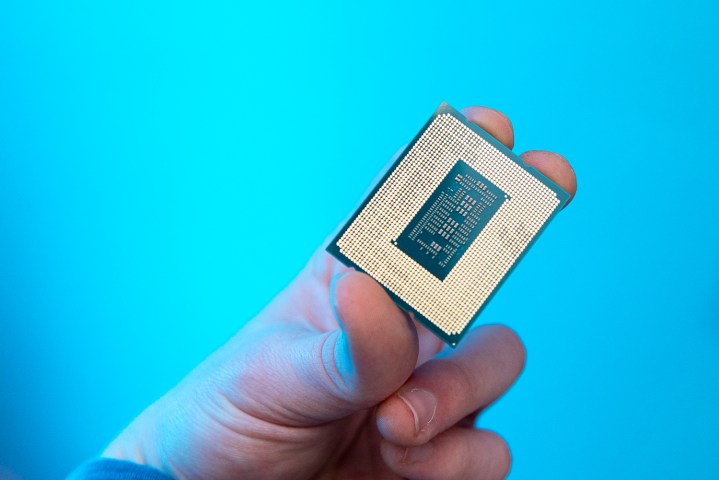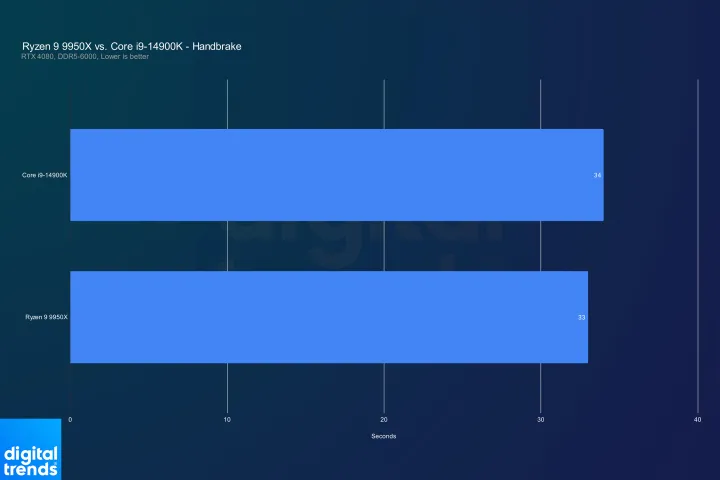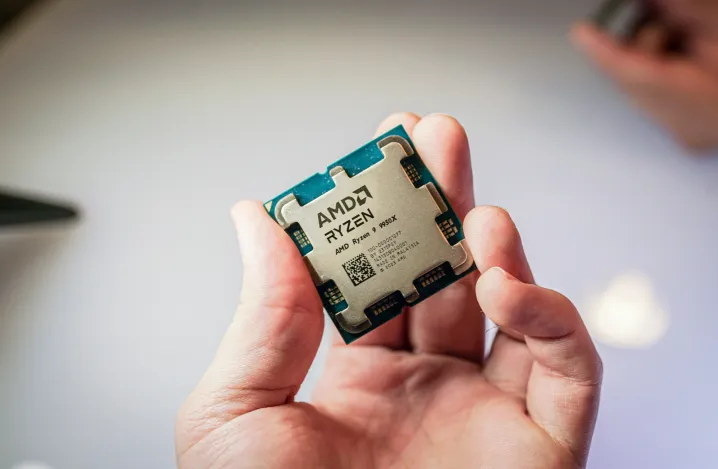AMD said its new Ryzen 9 9950X would be the best processor the world has ever seen, but it’s not off to a great start. As you can read in our Ryzen 9 9950X and Ryzen 9 9900X review, AMD’s latest flagship provides a few key advantages, but barely moves the needle in several other benchmarks.
Intel’s competing Core i9-14900K is proving itself surprisingly relevant in the face of new Zen 5 CPUs, especially considering its lower price. Both of these CPUs are monsters when it comes to gaming and productivity, there’s no doubt about that. But contrary to the past few years of CPUs releases, Intel actually has the upper hand in this battle.
Specs

Comparing the specs of an AMD and Intel CPU directly is a fool’s errand. With entirely different architectures, aspects like clock speed and cache amount don’t mean much when they’re directly compared to one another. Still, there are a couple of important notes when looking at the specs of these two CPUs.
First is packaging. Intel uses a hybrid architecture that combines performance (P) cores with efficient (E) cores. AMD, on the other hand, uses one core design across the entire CPU. The advantage for Intel is that it’s able to offer a far greater number of threads to applications that can take advantage of all of the cores it offers. The Ryzen 9 9950X with its 16 cores and 32 threads still has plenty of multi-threaded grunt, but Intel offers more.
| Ryzen 9 9950X | Core i9-14900K | |
| Cores/Threads | 16/32 | 24 (8 P + 16 E)/32 |
| L3/L2 Cache | 64MB / 16MB | 32MB / 32MB |
| Max turbo frequency | 5.7GHz | 6GHz |
| TDP | 170W | PL1: 125W / PL2: 253W |
The drawback of Intel’s approach is that not all of those threads are created equally. They can step in to help in some applications, but it’s really the eight P-cores that are pulling most of the weight. In addition, Intel doesn’t support hyperthreading on its E-cores. Because of that setup, the Core i9-14900K has more cores than the Ryzen 9 9950X, but both CPUs offer the same number of threads.
Which is better really depends on what you’re doing, but AMD’s more traditional approach is generally the better option for a desktop flagship. With the mix of cores Intel offers, it’s very important that the operating system schedules tasks on threads appropriately. Intel has done a good job of that with Thread Director, but there are still applications — like some games — that don’t schedule threads correctly, leading to a performance loss.

Outside of packaging, the other important note is power. AMD and Intel use slightly different numbers for power, but the Core i9-14900K still sucks down more watts. The Ryzen 9 9950X tops out at 170 watts, while the Core i9-14900K can climb up to 253W. In the chart above, which shows how many frames I achieved per watt spent in the games I tested, you can see how much less efficient the Core i9-14900K is compared to the Ryzen 9 9950X.
Pricing

Both the Ryzen 9 9950X and Core i9-14900K have the same list price of $650, but the actual price at retailers is much different. At the time of writing, the Ryzen 9 9950X just released, so it’s holding at its launch price of $650. Over time, it will drop, but that could take several months. Even the last-gen Ryzen 9 7950X is still selling for $520.
The Core i9-14900K has been on the market for nearly a year, and it’s much cheaper as a result. At the time of publishing, it’s available for $546. In addition, the last-gen Core i9-13900K — which offers very similar performance across the board — is $458. You should expect the Core i9-14900K to be about $100 cheaper than the Ryzen 9 9950X, at least for several months following the release of AMD’s latest CPU.
In addition to a lower price, Intel also has more versions of the Core i9-14900K available, most of which are cheaper. For instance, the Core i9-14900KF shaves the integrated graphics, but offers identical performance, and it’s available for $536. Similarly, the Core i9-14900F lacks integrated graphics and overclocking capabilities, but you can pick it up for $528.
I recommend checking up on pricing before making a buying decision. Over time, the Ryzen 9 9950X will drop in price and AMD will release cheaper variants similar to what we’ve seen with the Core i9-14900K. For now, and at least for several months, the Core i9-14900K is clearly ahead when it comes to pricing.
Productivity performance

The Core i9-14900K is a monster CPU, make no mistake. But the Ryzen 9 9950X is more of a monster. Starting with Cinebench R23, you can see that the two chips are competitive when it comes to single-core performance, despite the Core i9-14900K’s higher boost clock speed. In multi-core performance, however, the Ryzen 9 9950X dominates, despite the advantage Intel has with its hybrid approach to architecture and packaging.

AMD leads by about 10% in multi-core performance in Cinebench, but in real applications, the gap is sometimes even larger. In 7-Zip, for example, the Ryzen 9 9950X is about 12% ahead of the Core i9-14900K overall. While 7-Zip is traditionally an application that favors AMD CPUs, the Core i9-14900K closed that gap when it released last year. Now, AMD is back on top.

The most dominant showing for the Ryzen 9 9950X, however, was Blender. In this app, the Ryzen 9 9950X is over 20% ahead of the Core i9-14900K. Blender is an interesting workload to look at when it comes to CPUs, as it shows off the rendering capabilities of a chip. However, most modern rendering apps are GPU-accelerated, which offers exponentially higher performance than any CPU can currently muster.

Without a doubt, the Ryzen 9 9950X is faster than the Core i9-14900K when it comes to productivity applications. The gains aren’t always as stark, however. In Photoshop, for example, you can see above that the Ryzen 9 9950X was just 8% faster than the Core i9-14900K.

Similarly, in Handbrake, the two CPUs are nearly identical. The Ryzen 9 9950X technically completed the transcode 3% faster, and if you stretch that out over a longer transcoding time, it could add up to a more meaningful difference. Still, both of these CPUs are very similar in Handbrake.
Outside of raw performance, the Ryzen 9 9950X has the advantage of AVX-512 instruction support and a dedicated 512-bit data path. That is a huge boost for AI applications, in particular.
Overall, the Ryzen 9 9950X is about 15% faster than the Core i9-14900K and 18% more expensive, which is a good balance. If productivity is your main concern, I recommend picking up the Ryzen 9 9950X now, and especially once it starts dropping in price. The Core i9-14900K is by no means a weak CPU, though. It still puts up a good fight, and depending on the applications you’re using, it’s awfully close to the Ryzen 9 9950X.
Gaming performance

There isn’t much to talk about when it comes to gaming performance. The chart above tells the full story, with the Core i9-14900K consistently winning in tests. The only victory the Ryzen 9 9950X claimed was in Ashes of the Singularity, and even then, the lead is negligible at best.
You don’t buy a flagship CPU specifically for gaming, but the performance of the Ryzen 9 9950X is disappointing. The Core i9-14900K is nearly a year old, and it comfortably runs away with gaming performance. Given that Intel is already leading, it’s hard to imagine AMD will be able to fight back once Arrow Lake CPUs are here.
If gaming performance is your primary concern, however, neither of these CPUs are the best option. I still recommend gamers pick up the Ryzen 7 7800X3D. It’s the best processor for gaming, full stop, and it’s cheaper than both the Core i9-14900K and Ryzen 9 9950X.
Although the Core i9-14900K is ahead in gaming, there’s one area where the Ryzen 9 9950X has a lead. AMD’s latest CPU has a 512-bit data path for AVX-512 instructions, which offers a big boost in some gaming scenarios. In particular, AVX-512 instructions are very important for PS3 emulation.
A note on stability

Intel has seen some issues with stability on its 13th-gen and 14th-gen CPUs, particularly when it comes to high-end unlocked models like the Core i9-14900K. According to Intel, improper voltage delivery to the CPU can lead to rapid degradation. Over time, the processor will become less and less stable. That usually starts with a few odd game crashes and eventually moves onto full system lockups and Blue Screens of Death.
After months, Intel has released a microcode update that apparently addresses these issues. The company says it’s a preventative measure, and that CPUs that aren’t experiencing instability shouldn’t fall victim with the microcode update. In addition, Intel has extended the warranty on all of its 13th-gen and 14th-gen CPUs from three years to five years, and that applies to new CPUs purchased.
Only time will tell if Intel’s microcode update really solves the instability problem. If you’re buying a CPU now, it’s something to keep in mind.
A bloodbath

The Core i9-14900K shouldn’t really be competitive with the Ryzen 9 9950X, but it is. AMD’s latest definitely runs away with productivity, but it loses plenty of ground in gaming and comes in at a much higher price. More importantly, the Core i9-14900K is nearly a year old. With AMD only providing performance advantages in some areas, it’s hard to imagine the Ryzen 9 9950X will be able to keep up when Intel’s Arrow Lake CPUs release.
At the moment, the Ryzen 9 9950X is the fastest CPU you can buy, at least when it comes to non-gaming workloads. It’s also the most expensive at $650. If you don’t mind trading a bit of productivity performance for more gaming grunt, the Core i9-14900K is the way to go given how much cheaper it is — just make sure to keep your warranty information handy.





